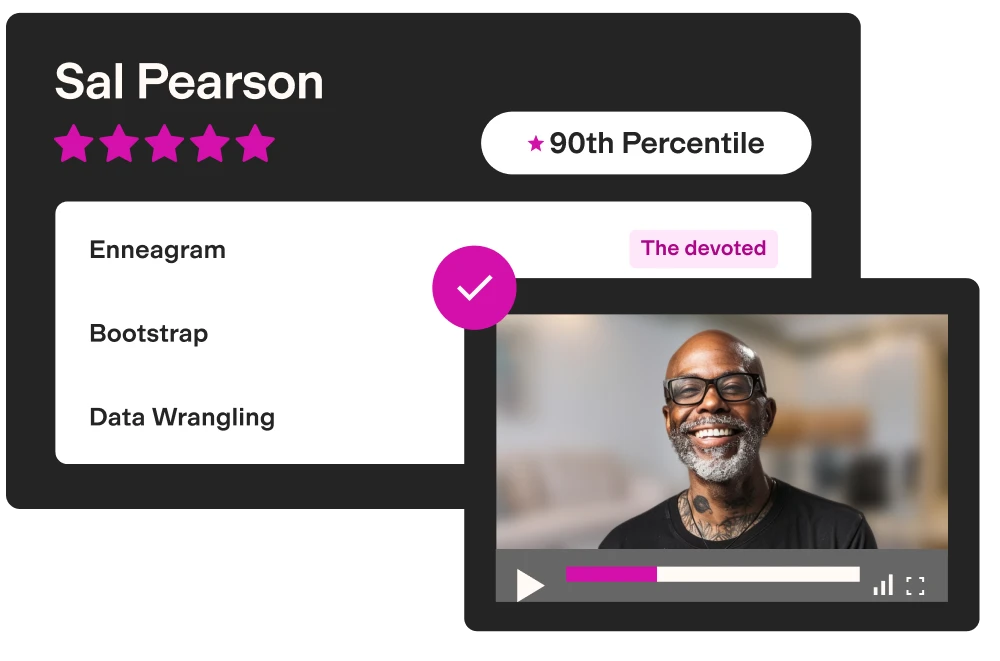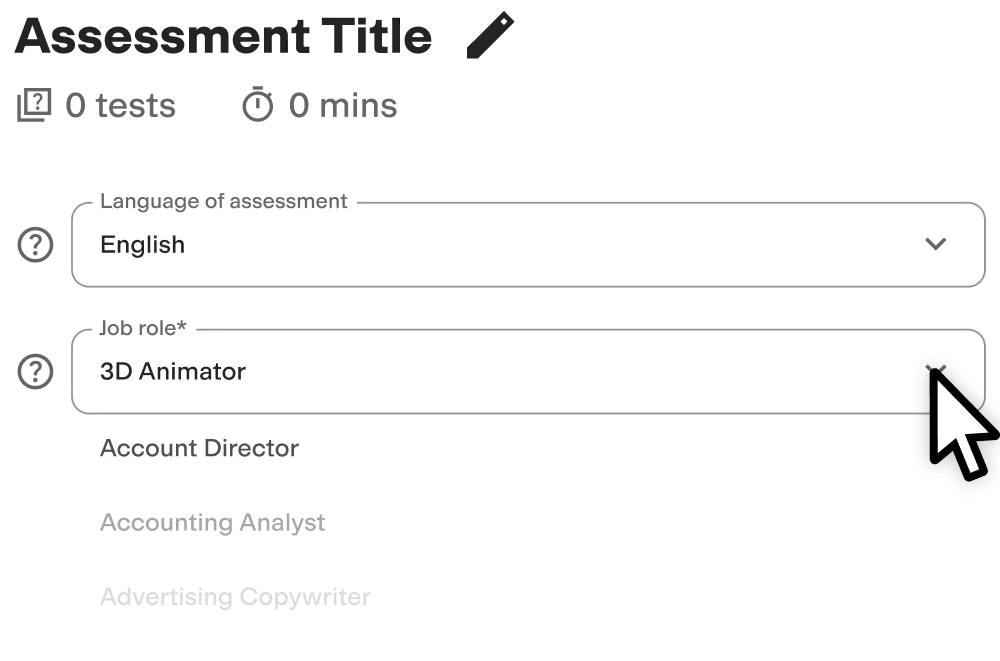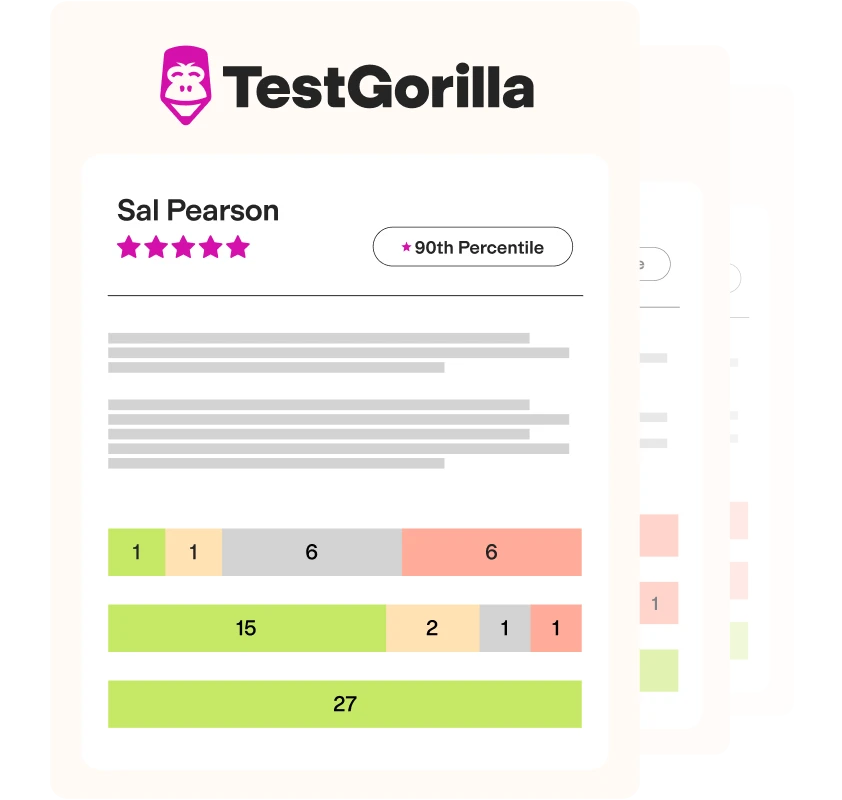Tableau test
Summary of the Tableau test
Our Tableau test evaluates candidates’ abilities to use the software to manage data, build visualizations for business insights and objectives, and design user dashboards. Test-takers who score highly demonstrate strong Tableau skills to take your company’s data visualization solutions to the next level.
Covered skills
Connecting and managing data
Creating and performing advanced calculations
Building visualizations based on requirements
Designing interactive and shareable dashboards
Use the Tableau assessment test to hire
Business intelligence analysts, analytics developers, certified data analysts, data engineers, data scientists, accountants, SQL developers, and other roles that require a strong grasp of Tableau.
About the Tableau test
Tableau is a powerful, versatile data analytics platform that helps users translate complex information into actionable insights.
Our Tableau test assesses candidates’ skills in the software's core uses, such as reading, understanding, and connecting data, performing complex calculations, and building visualizations to help track KPIs.
It has multiple-choice questions in which candidates choose the calculations to solve problems and functions to perform certain tasks.
Check out the preview questions for examples of what’s included.
Candidates who perform well on our Tableau online test are:
Confident in making informed decisions based on objective, accurate data
Technically skilled in Tableau’s various fundamental functions and tools
Exceptional at managing large and complex datasets
Comfortable creating interactive dashboards and visualizations
Highly communicative and adept at translating information for different audiences
The test is made by a subject-matter expert
TestGorilla’s tests are created by subject matter experts. We assess potential subject-matter experts based on their knowledge, ability, and reputation.Before being published, each test is peer-reviewed by another expert, then calibrated using hundreds of test takers with relevant experience in the subject.
Our feedback mechanisms and unique algorithms allow our subject-matter experts to constantly improve their tests.
Alejandro W.
A certified Microsoft Data Analyst Associate with over eight years of experience as a business intelligence developer, Alejandro knows data like the back of his hand. His extensive repertoire of data analytics tools includes Tableau, Qlik Sense, Qlikview, Power BI, SQL, and Python.
Alejandro has applied his powerful data skills for clients and employers ranging from large international banks and multinational telecommunications companies to oil and gas giants.
Use TestGorilla to hire the best faster, easier and bias-free
Our screening tests identify the best candidates and make your hiring decisions faster, easier, and bias-free.
Create high-quality assessments, fast
Building assessments is a breeze with TestGorilla. Get started with these simple steps.
Why are Tableau skills important to employers?
Employers look for candidates with strong Tableau skills who excel at managing data and creating insightful, actionable reports to support confident business decision-making.
They hire innovative Tableau analysts who think deeply about how people digest information so they can help stakeholders and team members understand and visualize goals.
Tableau itself is popular with employers because:
It can handle large amounts of data and integrations
It’s mobile-friendly
It’s easy to integrate with R or Python coding
Its visualization tools are highly customizable, hands-on, and easy to understand.
Tableau-certified associates and people skilled in the software help companies as diverse as Jaguar Land Rover and Keybank become more data-driven and increase business value.
4 Tableau developer technical competencies to look for
Here are four key competencies you can use our Tableau assessment test to measure
Interpreting and managing data: Tableau experts know how to use the platform to consolidate relevant information, remove duplicates, and create clear data narratives
Creating and performing advanced calculations: Top applicants can use Tableau to make calculations to answer complex questions and inform forecasts
Building visualizations based on requirements: Tableau developers can create charts, diagrams, tables, and action points at stakeholders’ requests
Building interactive and shareable dashboards: The best candidates create custom dashboards that decision-makers can use in the Tableau app
3 Tableau developer soft skills to look for
Top Tableau developers and analysts have the following soft skills, which you can test for using our multi-measure assessments:
Communication: Tableau developers need excellent oral and written communication skills to be good team players. They use these skills to actively listen and engage with others.
Problem solving: Tableau experts stay flexible in handling various data processing tasks and problems. They have solution-oriented mindsets and enjoy analyzing data to find insights.
Time management: Top analysts understand the importance of schedules and plan actions ahead of time. They use time management skills to hit their deadlines.
Testing skills and experience with Tableau is a great way to ensure applicants can prove their aptitude beyond resumes alone.
For example, financial data analysis experts such as MedX use TestGorilla to gain objective insight into the people they hire. Since moving to skills testing, the company’s quality of hire has improved, and its recruitment funnel is now more efficient and reliable.
What job roles can you hire with our Tableau skills test?
Analyzing and gleaning insights from data efficiently is essential for many different businesses. Therefore, we developed our Tableau skills assessment so you can use it to hire various data science experts.
Here’s a selection of technical roles where Tableau skills are useful:
Accountants collect and measure financial data and produce reports and visualizations to track revenue and expenses
Analytics developers design resources such as dashboards that break down complex data for users to interact with
Business intelligence and data analysts create reports based on productivity and efficiency data to suggest improvements
Data engineers and scientists collate and clean data sources to solve problems, build solid business forecasts, and make information more accessible
Database administrators organize, prepare, and arrange information into interactive databases for multiple audiences
SQL developers create and maintain SQL databases, applications, and code to help users manage data and solve problems
Create a multi-measure assessment: 4 tests to pair with the Tableau test
Together with our Tableau skills test, we recommend you use a range of tests to hire well-rounded data experts. With TestGorilla’s multi-measure assessment builder, you can design a custom assessment to measure up to five of your candidate’s hard and soft skills.
Here are four skill tests we recommend using alongside the Tableau test:
SQLite (coding): Entry-level Database Operations test: Measure a candidate’s ability to create and manage basic databases using SQLite coding. Consider using our SQLite (coding): Intermediate-level Querying test to measure more advanced data skills.
Communication test: Assess an applicant’s ability to listen to others and process instructions, such as for data collation and reporting. This test also measures how well a person delivers information to different audiences.
Problem-solving test: Test candidates' ability to define specific problems and find resolutions through data and text analysis. This test observes an applicant’s use of logic and reasoning.
Working With Data test: Gauge a jobseeker’s capacity to handle data correctly, perform accurate data analysis, and present results attractively. More advanced tests are also available so feel free to pick the most appropriate one based on the job opening.
FAQs
View a sample report
The Tableau test will be included in a PDF report along with the other tests from your assessment. You can easily download and share this report with colleagues and candidates.







